Page Summary
-
This guide explains how to use the Google Mobile Ads SDK with Chartboost mediation for waterfall integrations in Unity apps.
-
The Chartboost mediation adapter supports bidding and waterfall integrations, and banner, interstitial, and rewarded ad formats.
-
Key requirements include the latest Google Mobile Ads SDK, Unity 4 or higher, and specific Android/iOS deployment targets.
-
You need to set up configurations in the Chartboost UI, including creating your app and noting your App ID, App Signature, User ID, and User Signature.
-
The guide covers implementing privacy settings for GDPR and US state regulations, importing the Chartboost SDK and adapter, adding required code (for iOS), and testing your implementation.
This guide shows you how to use Google Mobile Ads Unity Plugin to load and display ads from Chartboost using mediation, covering waterfall integrations. It covers how to add Chartboost to an ad unit's mediation configuration, and how to integrate the Chartboost SDK and adapter into a Unity app.
Supported integrations and ad formats
The Ad Manager mediation adapter for Chartboost has the following capabilities:
| Integration | |
|---|---|
| Bidding | |
| Waterfall | |
| Formats | |
| Banner | |
| Interstitial | |
| Rewarded | |
Requirements
- Latest Google Mobile Ads Unity Plugin
- Unity 4 or higher
- To deploy on Android
- Android API level 23 or higher
- To deploy on iOS
- iOS deployment target of 12.0 or higher
- A working Unity project configured with Google Mobile Ads Unity Plugin. See Get Started for details.
- Complete the mediation Get started guide
Step 1: Set up configurations in Chartboost UI
Sign up for a Chartboost account and log in once your account is verified. Then, navigate to the Apps management tab.
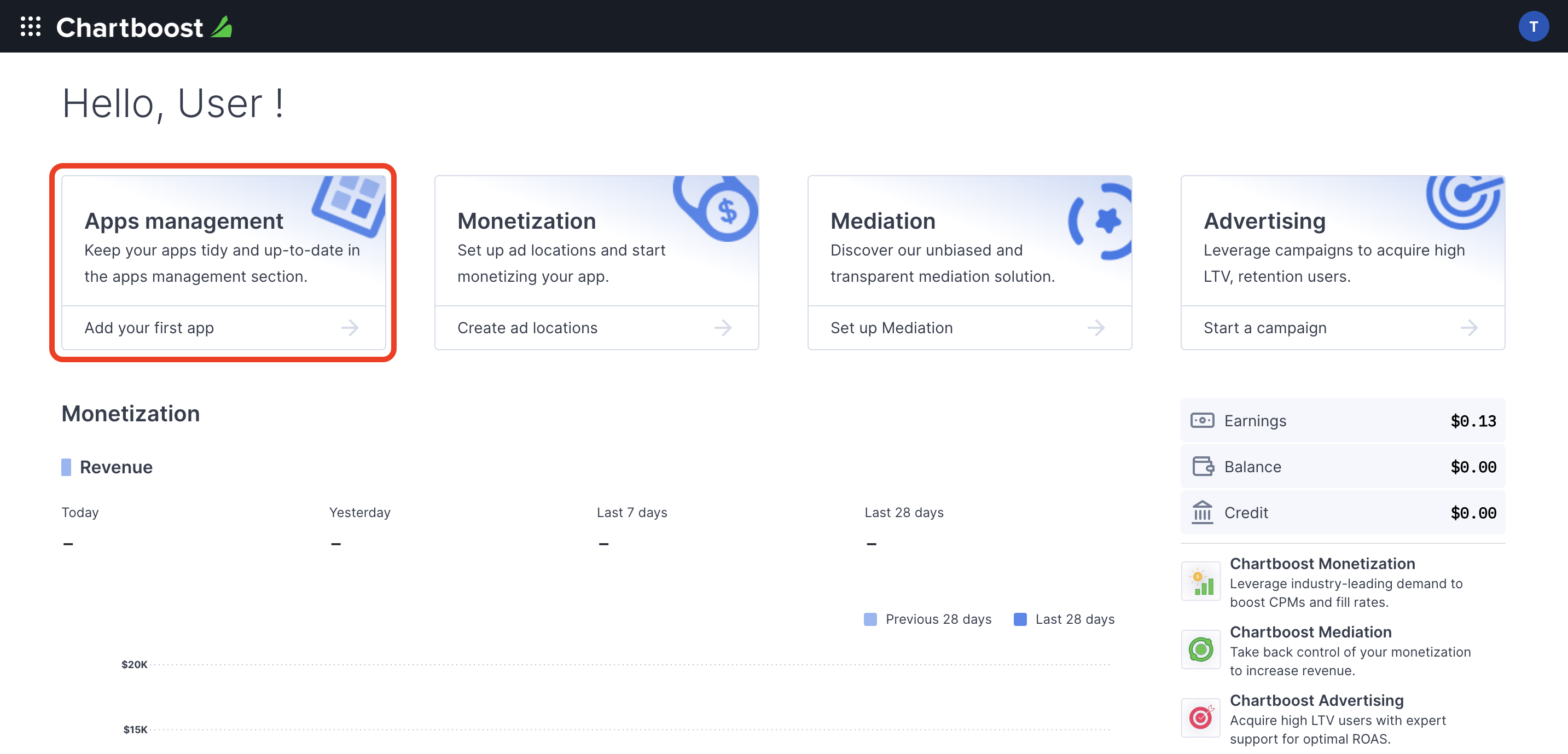
Click the Add new app button to create your app.
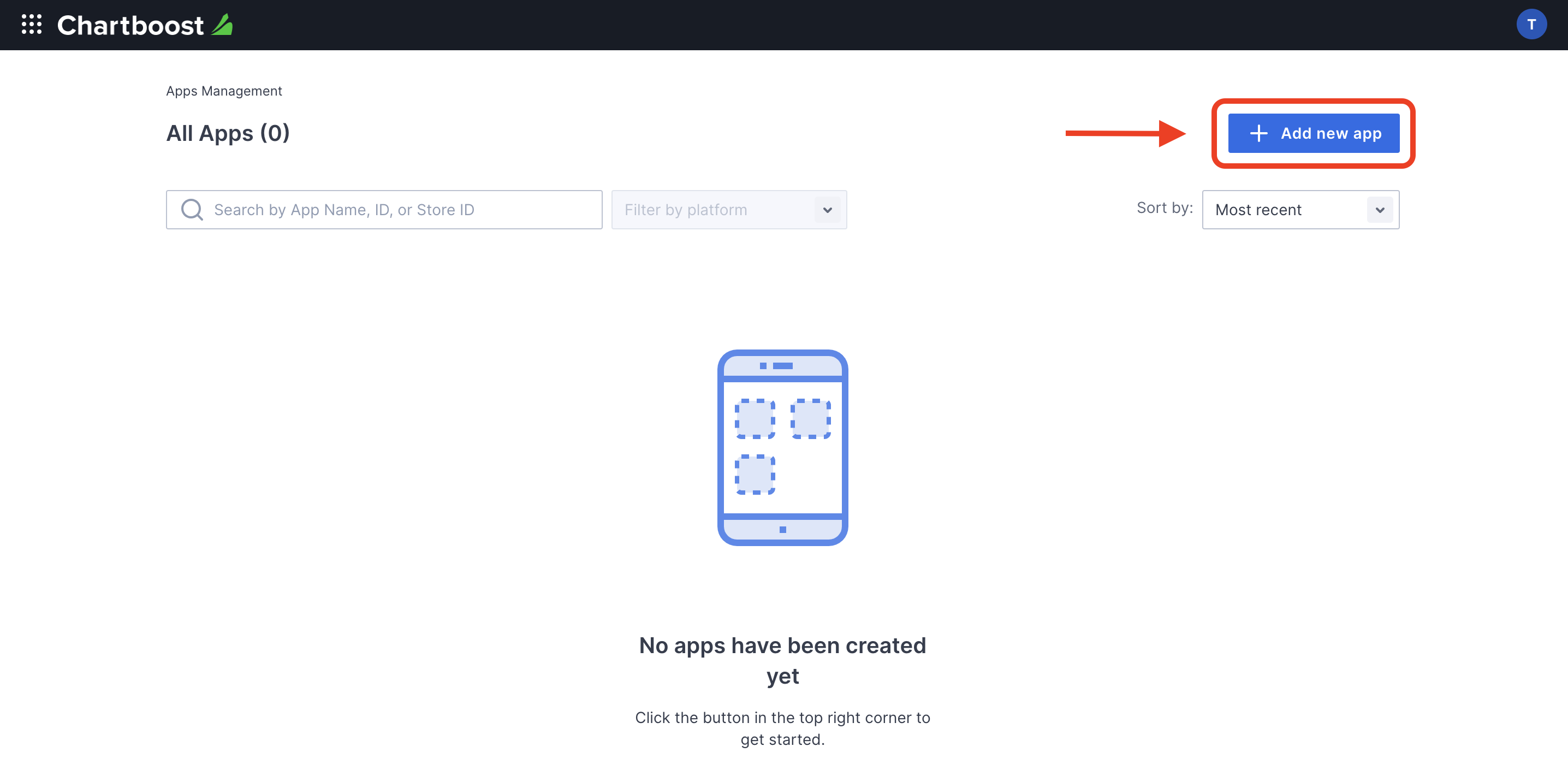
Fill out the rest of the form and click the Add App button to finalize your app.
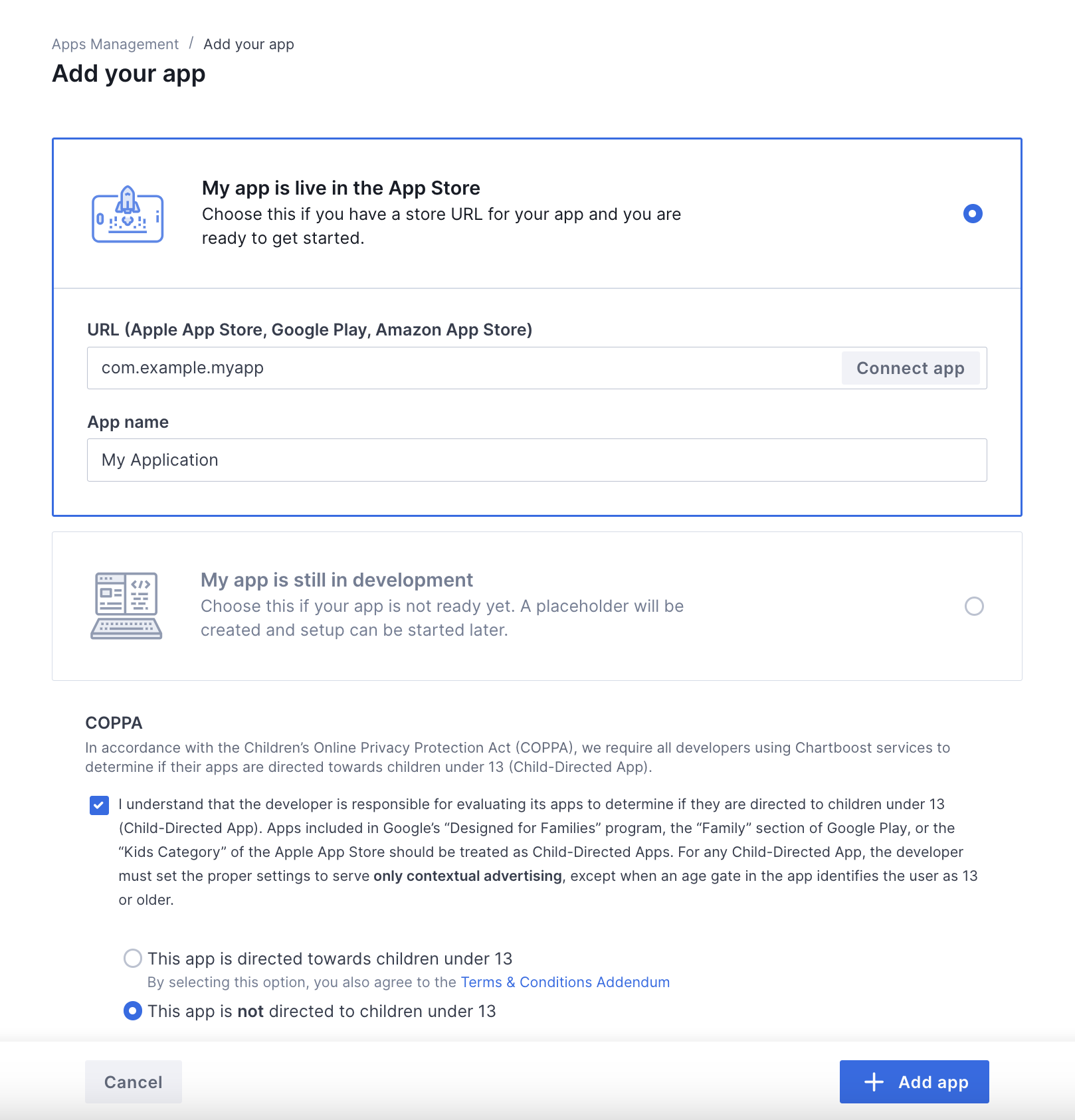
After your app is created, you will be directed to its dashboard. Take note of the App ID and App Signature of your app.
Android
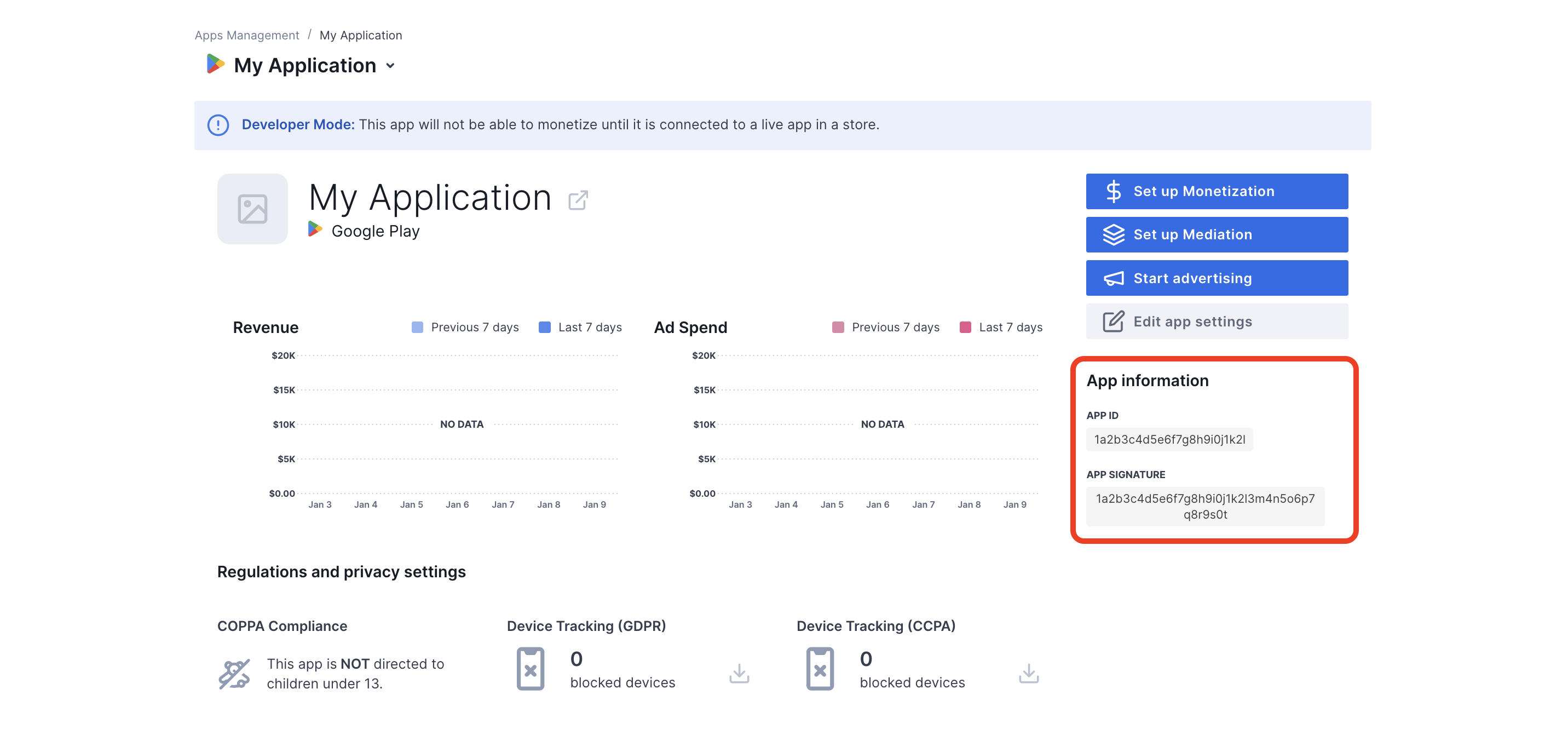
iOS
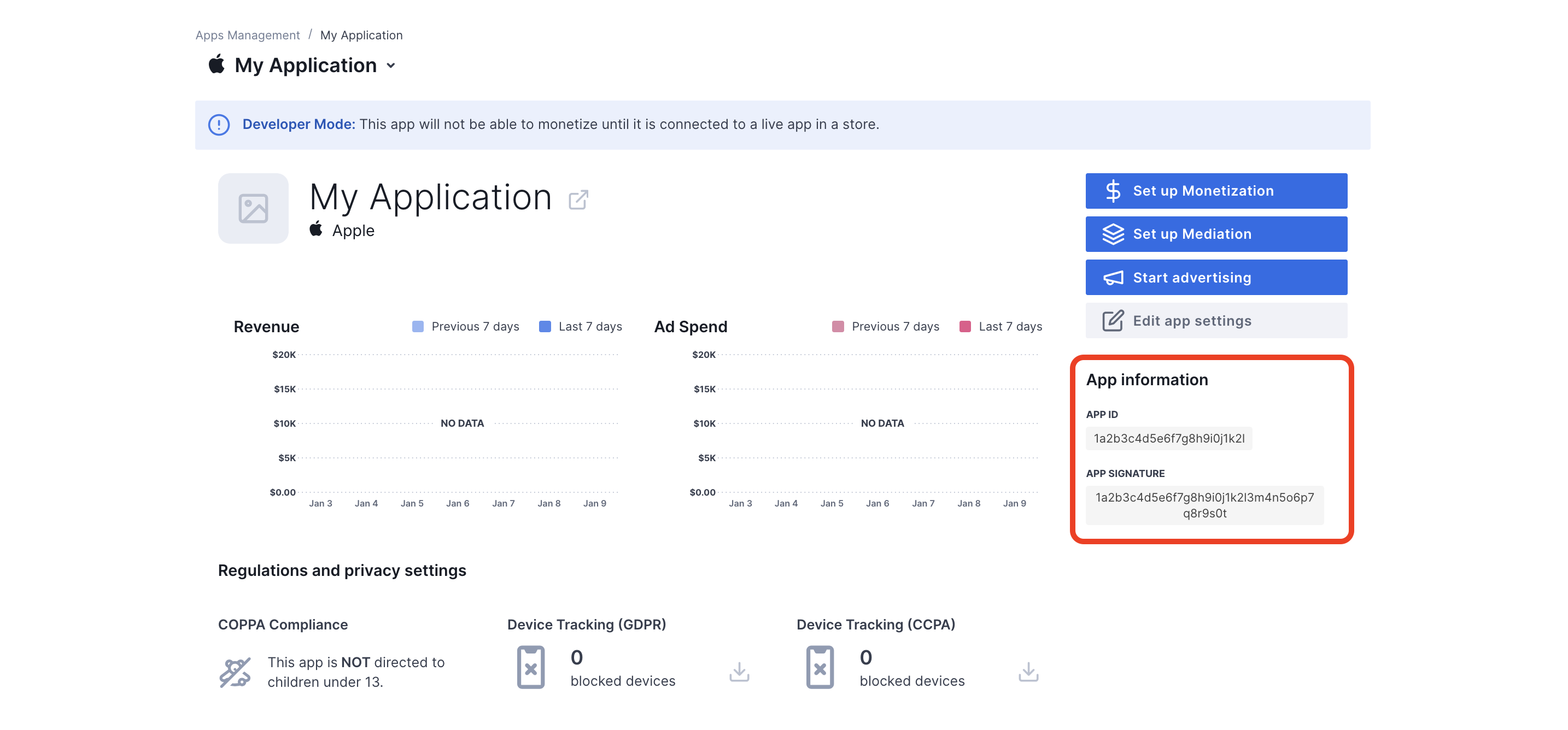
Ad Manager requires the Chartboost User ID and User Signature for setting up your Ad Manager ad unit ID. You can find these parameters by clicking Chartboost mediation on the Chartboost UI.
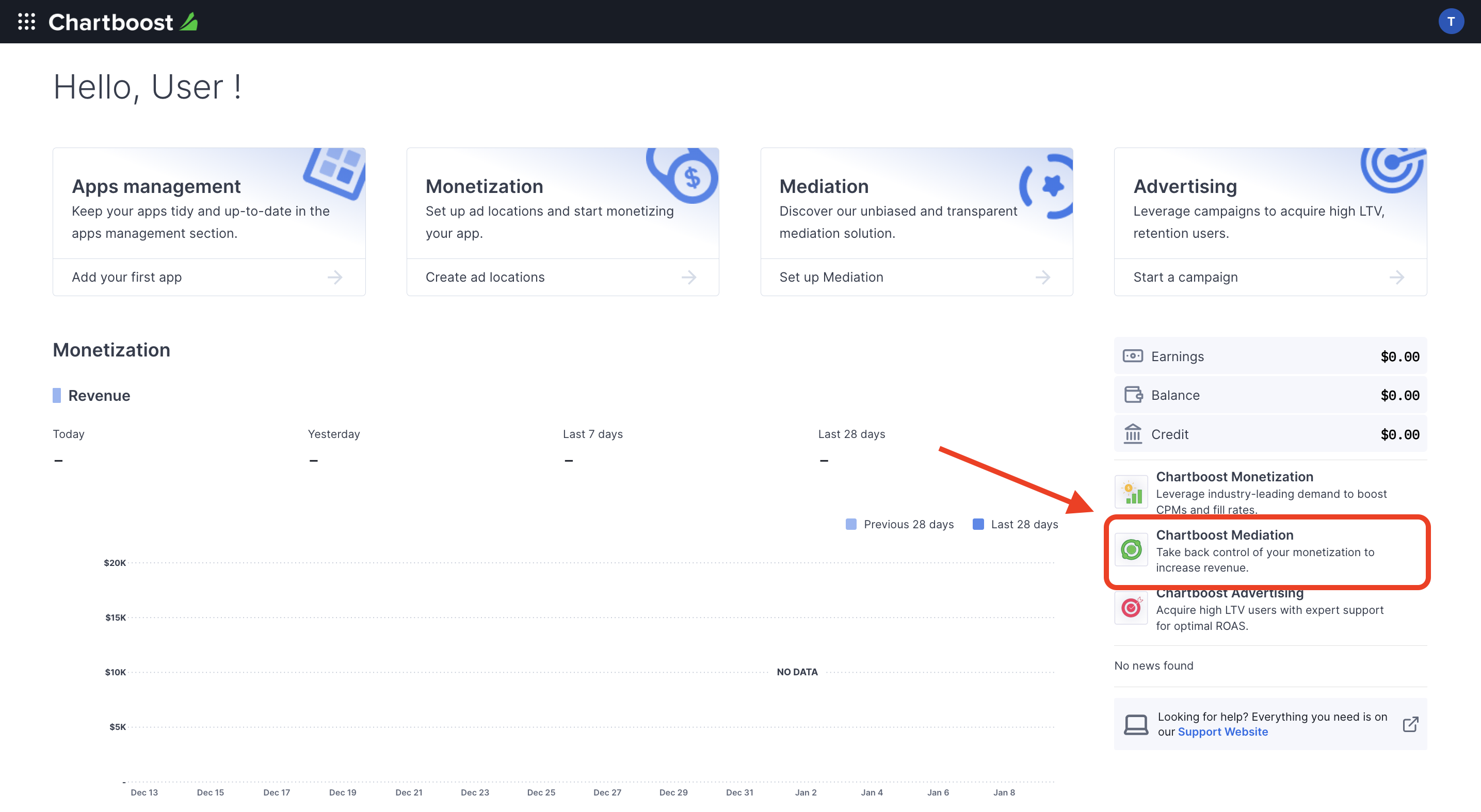
Navigate to the Resources > API Explorer tab and take note of your User ID and User Signature located under the Authentication section.
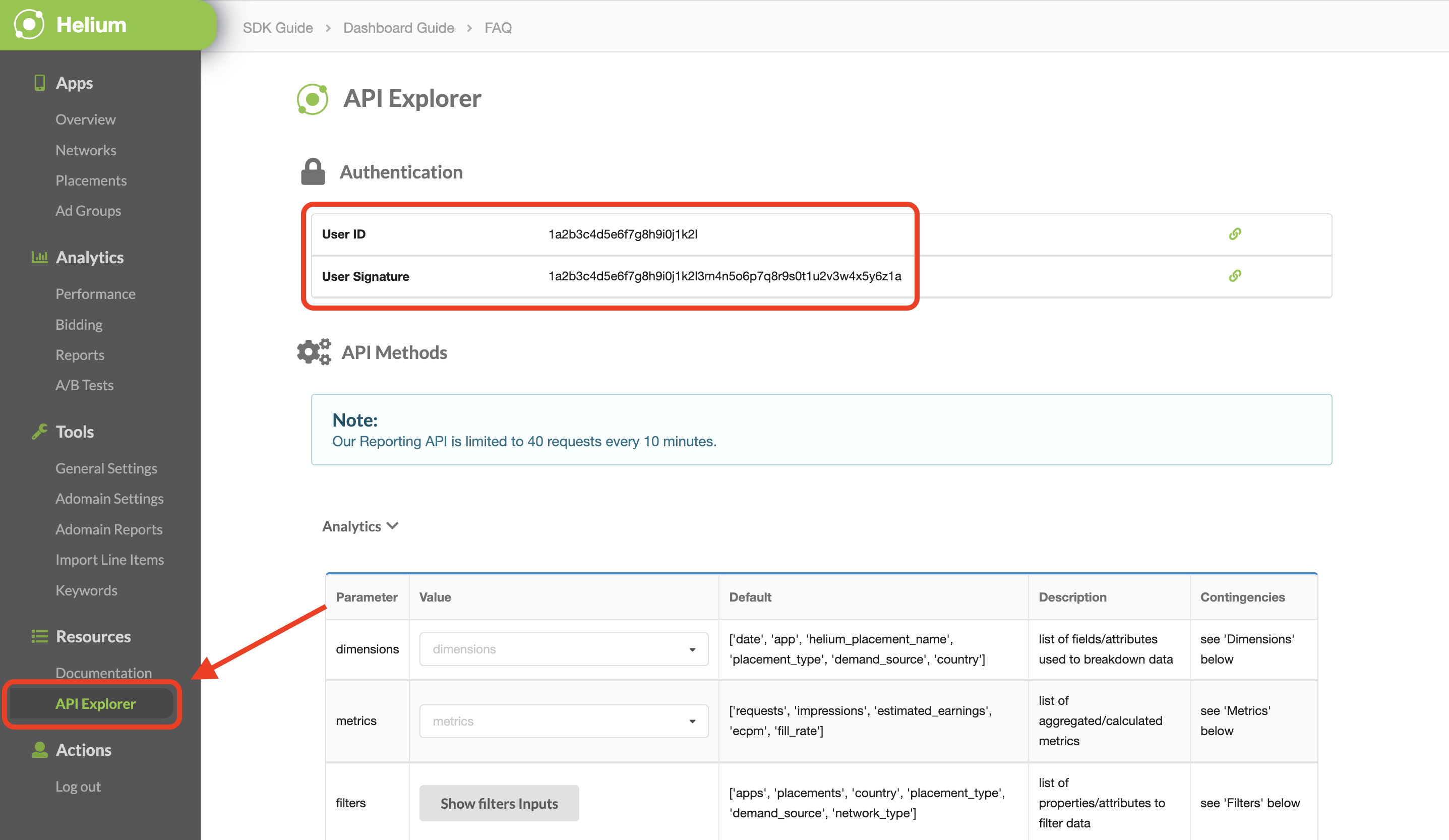
Update your app-ads.txt
Authorized Sellers for Apps app-ads.txt is an IAB Tech Lab initiative that helps ensure your
app ad inventory is only sold through channels you've identified as authorized. To prevent a
significant loss in ad revenue, you'll need to implement an app-ads.txt file.
If you haven't done so already,
create an app-ads.txt file for Ad Manager.
To implement app-ads.txt for Chartboost, see
app-ads.txt.
Turn on test mode
You can enable test mode on your app by navigating to the Apps management tab from the Chartboost UI, selecting your app from the list and clicking on Edit app settings.
Android
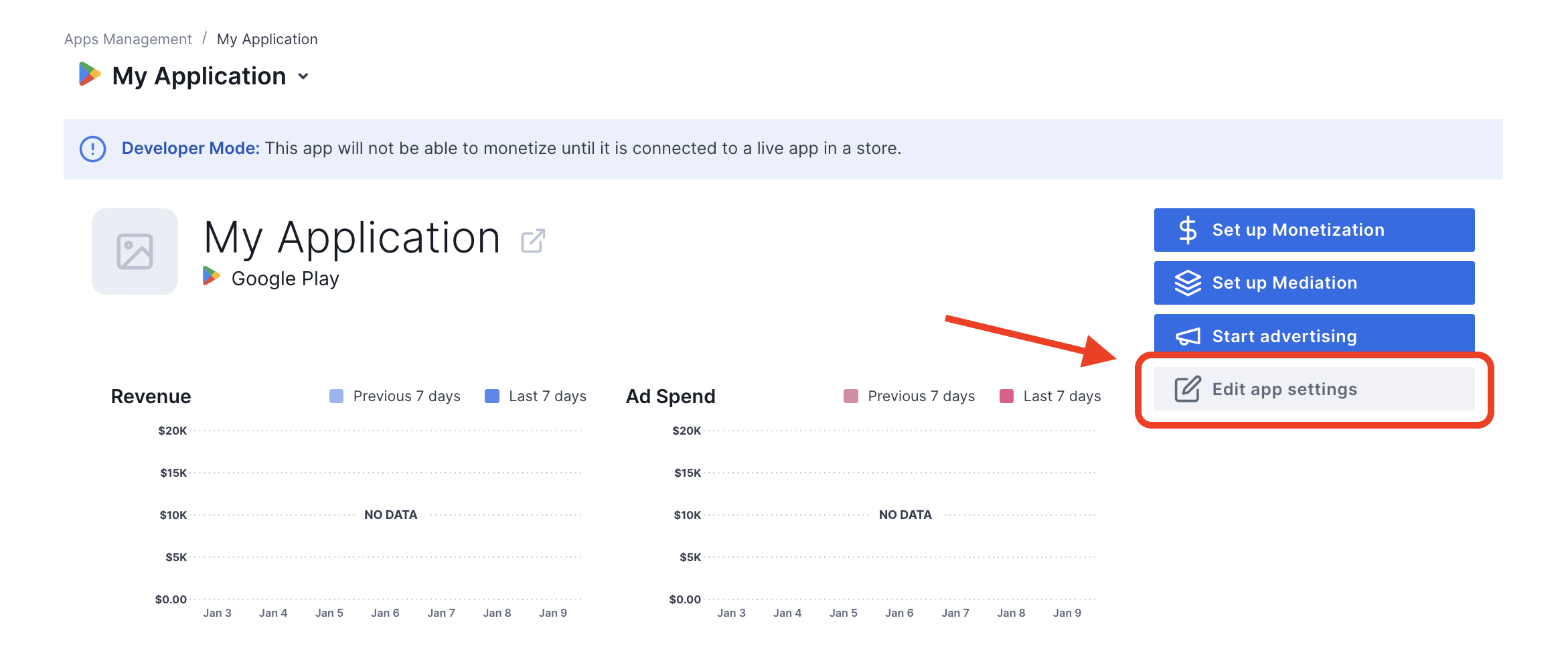
iOS
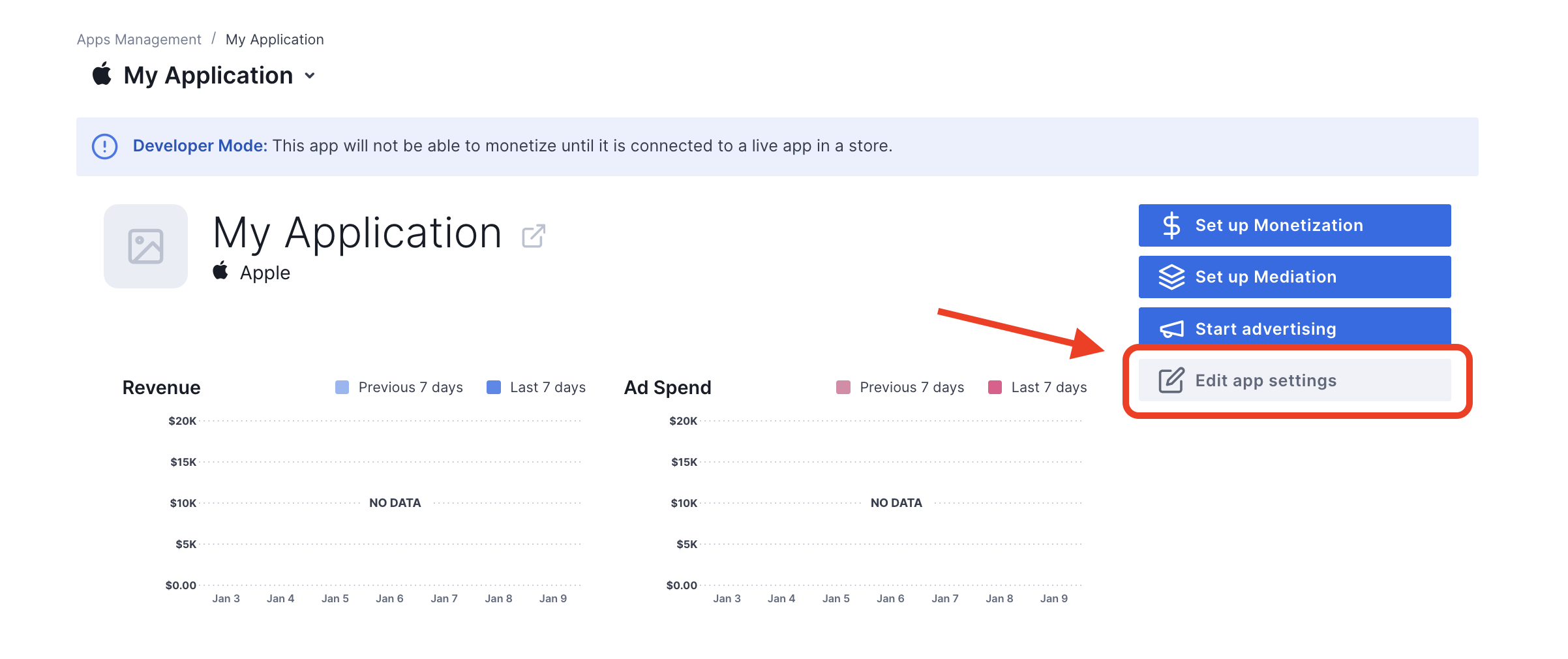
From your app's settings, you can toggle Test mode on your app.
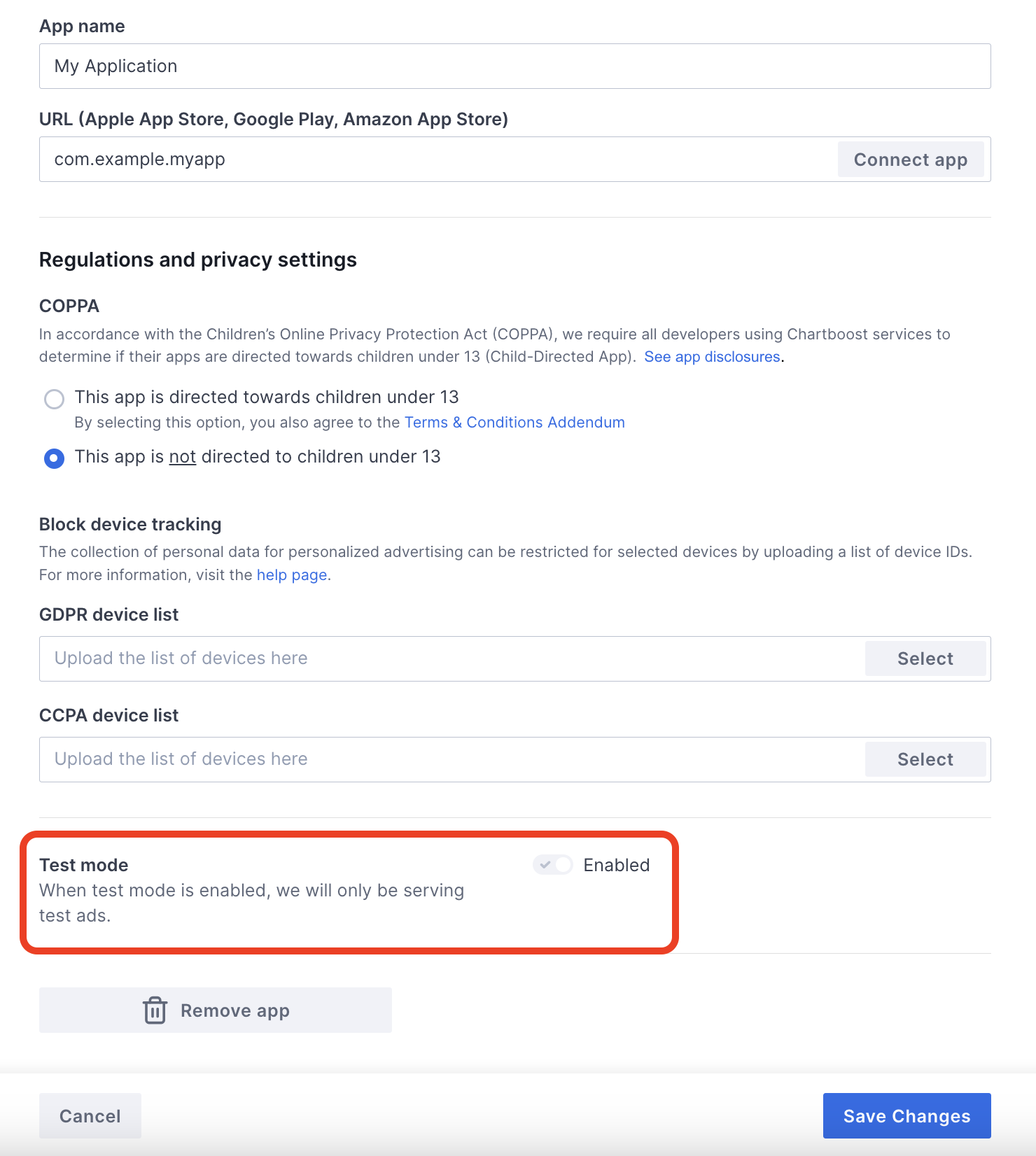
Once test mode is enabled, you can request ads using the ad unit ID created earlier and receive a Chartboost test ad.
After you are able to receive Chartboost test ads, your app will be placed on Chartboost's Publisher App Review. In order for monetization on Chartboost to work, the publisher app review will need to be approved by Chartboost.
Step 2: Set up Chartboost demand in Ad Manager UI
Configure mediation settings for your ad unit
Android
For instructions, see step 2 in the guide for Android.
iOS
For instructions, see step 2 in the guide for iOS.
Add Chartboost to GDPR and US state regulations ad partners list
Follow the steps in European regulations settings and US state regulations settings to add Chartboost to the European and US state regulations ad partners list in the Ad Manager UI.
Step 3: Import the Chartboost SDK and adapter
OpenUPM-CLI
If you have OpenUPM-CLI installed, you can install the Google Mobile Ads Chartboost Mediation Plugin for Unity to your project by running the following command from your project's root directory:
openupm add com.google.ads.mobile.mediation.chartboostOpenUPM
In your Unity project editor, select Edit > Project Settings > Package Manager to open the Unity Package Manager Settings.
Under the Scoped Registries tab, add OpenUPM as a scoped registry with the following details:
- Name:
OpenUPM - URL:
https://package.openupm.com - Scope(s):
com.google
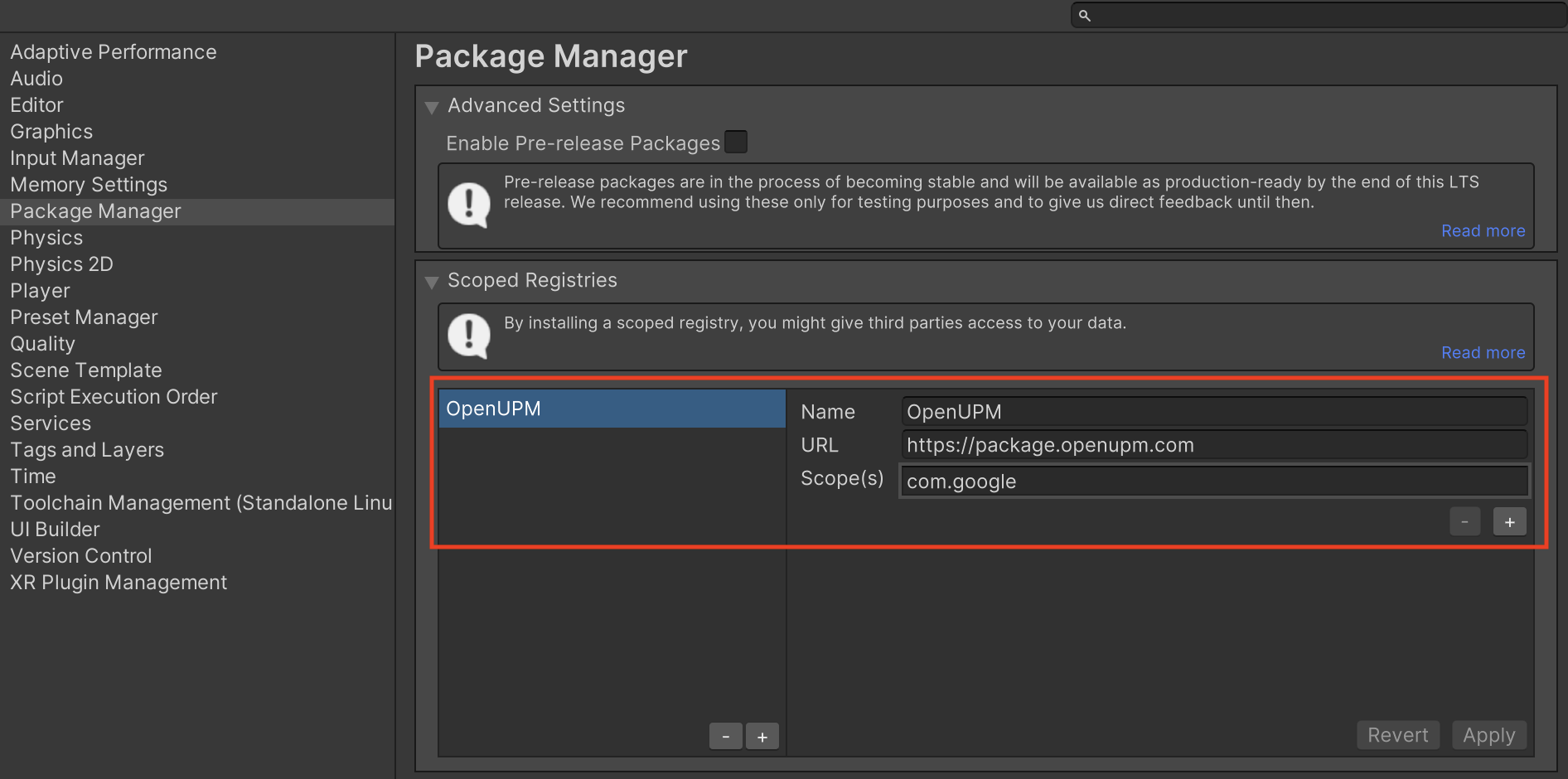
Then, navigate to Window > Package Manager to open the Unity Package Manager and select My Registries from the drop-down menu.
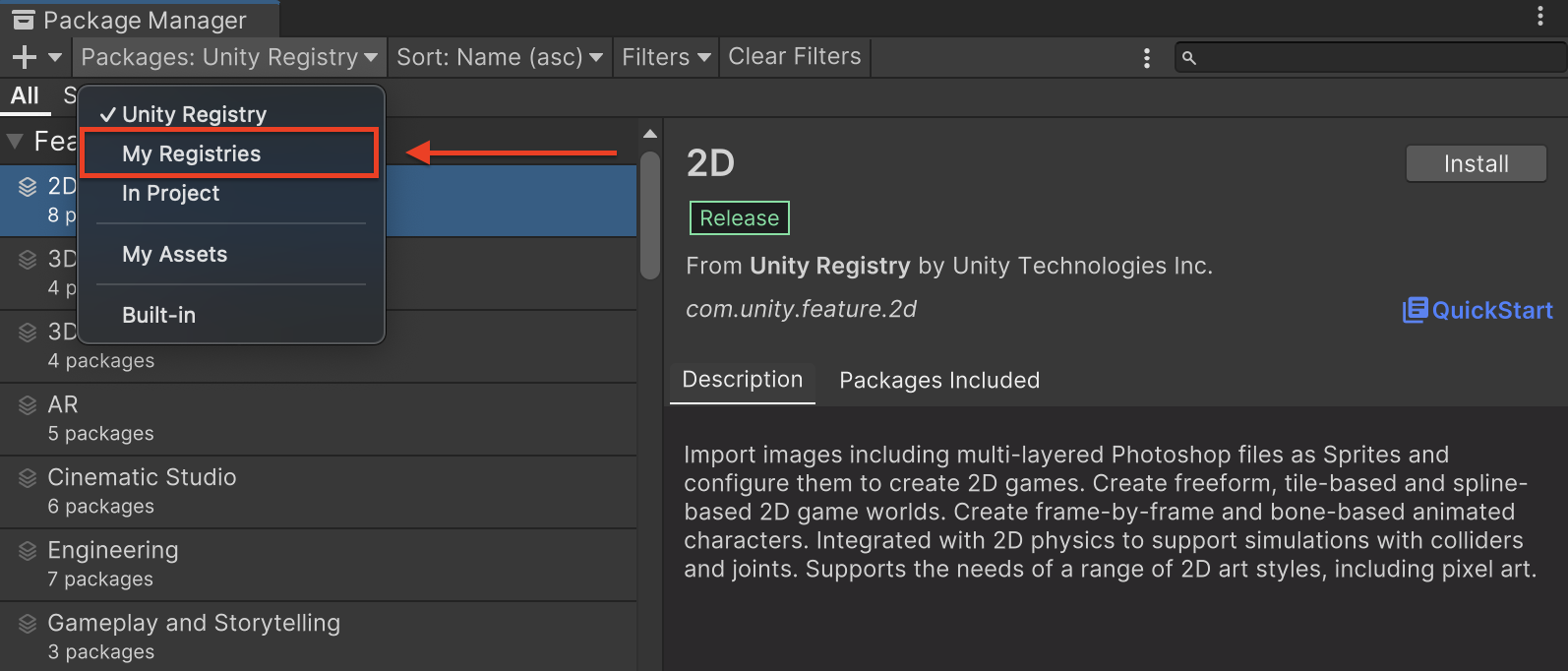
Select the Google Mobile Ads Chartboost Mediation package and click Install.
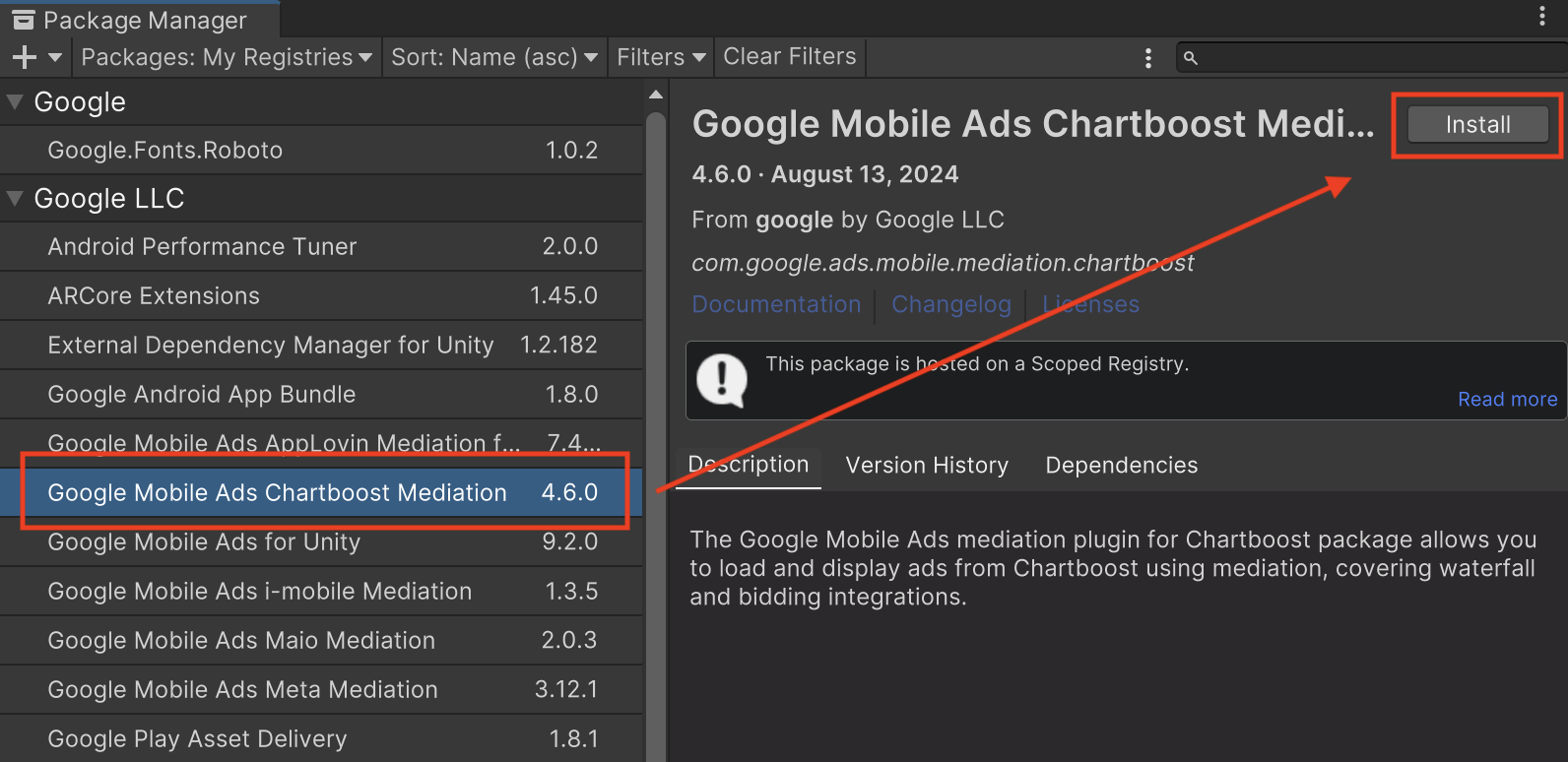
Unity Package
Download the latest version of Google Mobile Ads mediation plugin for
Chartboost from the download link in
the
Changelog
and extract the
GoogleMobileAdsChartboostMediation.unitypackage from the zip
file.
In your Unity project editor, select Assets > Import Package >
Custom Package and find the
GoogleMobileAdsChartboostMediation.unitypackage
file you downloaded. Make sure that all the files are selected and click
Import.
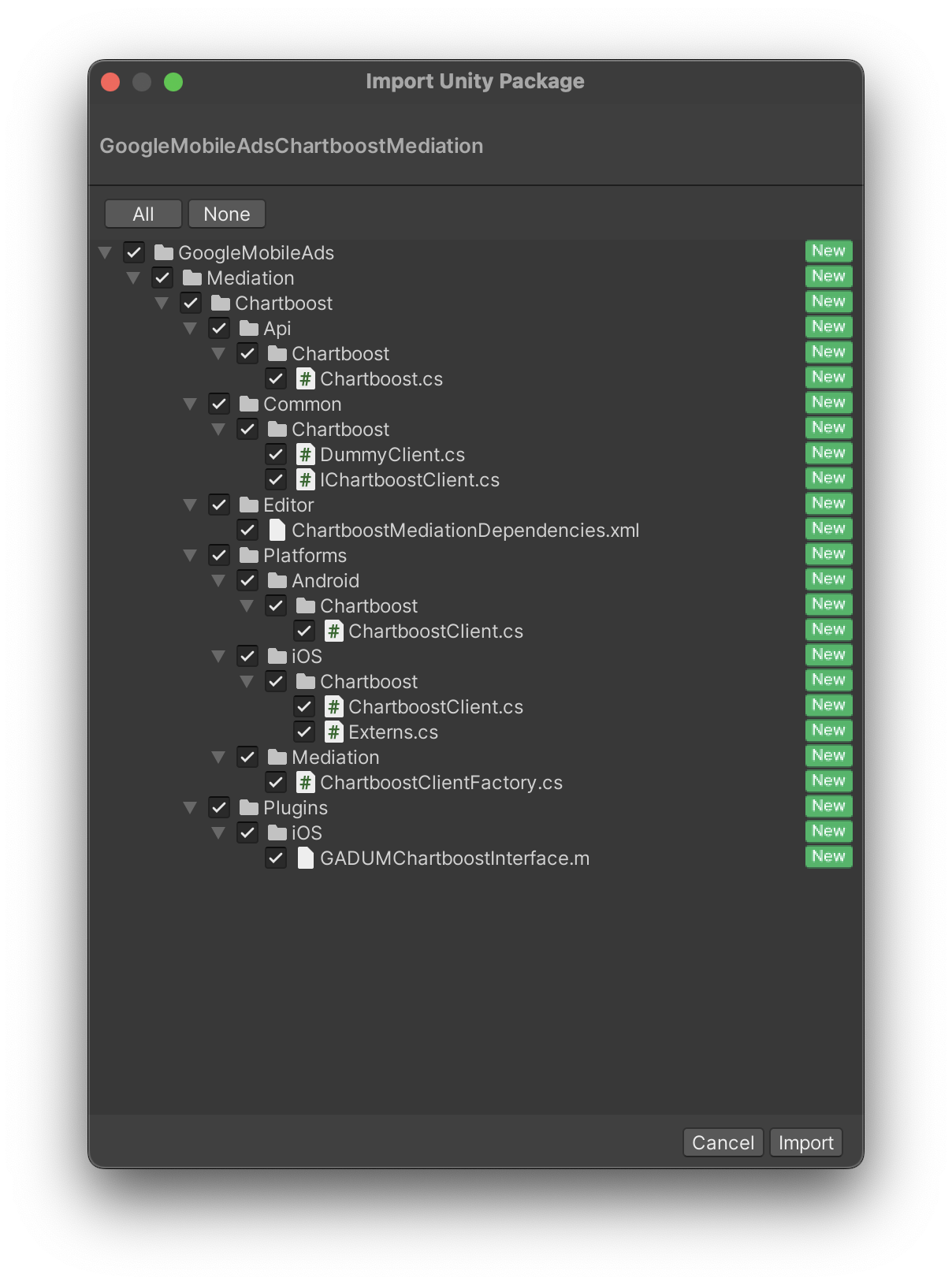
Then, select Assets > External Dependency Manager >
Android Resolver > Force Resolve. The External Dependency Manager
library will perform dependency resolution from scratch and copy the
declared dependencies into the Assets/Plugins/Android directory of your
Unity app.
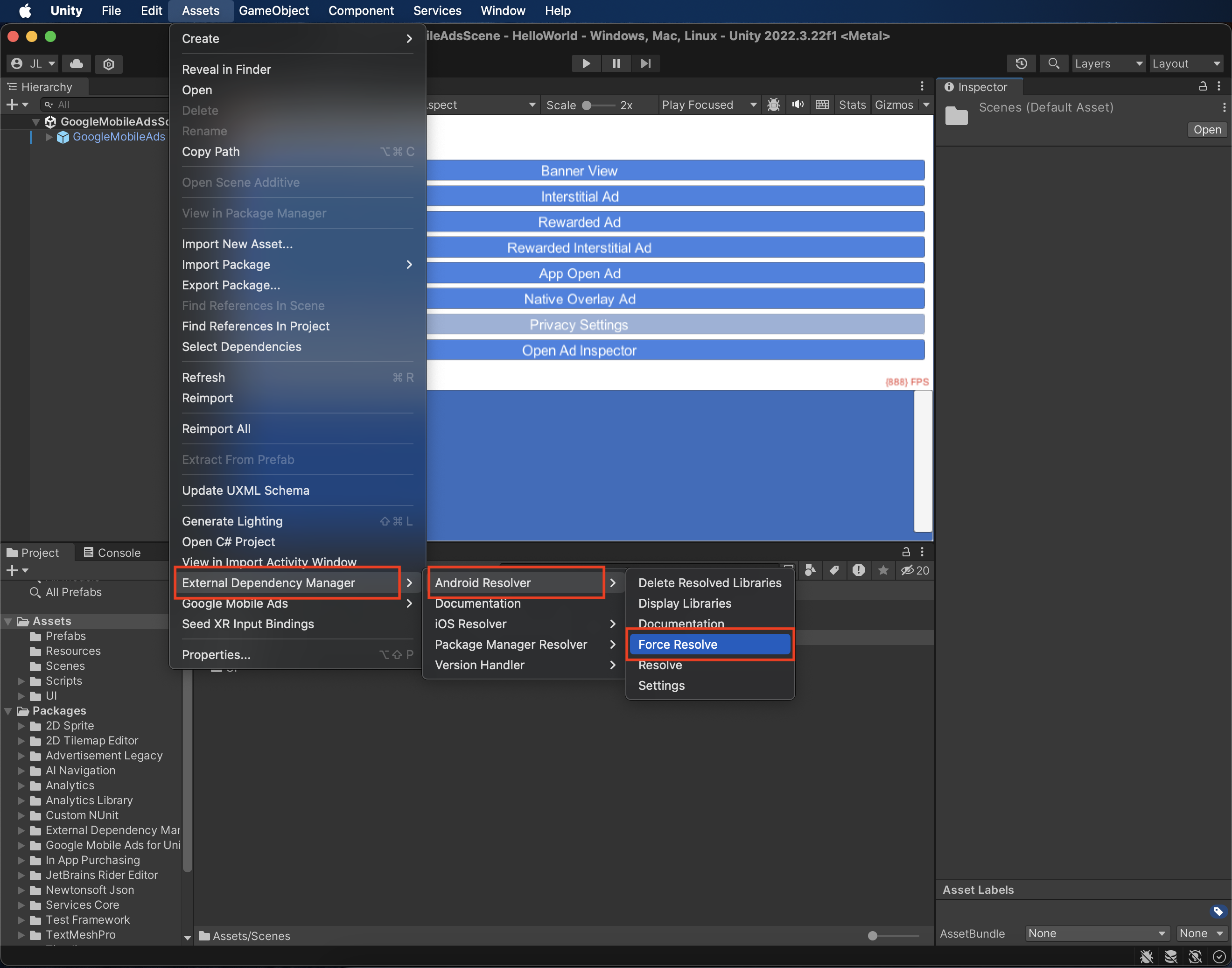
Step 4: Implement privacy settings on Chartboost SDK
EU Consent and GDPR
To comply with Google EU User Consent Policy, you must make certain disclosures to your users in the European Economic Area (EEA), the UK, and Switzerland, and obtain their consent for the use of cookies or other local storage where legally required, and for the collection, sharing, and use of personal data for ads personalization. This policy reflects the requirements of the EU ePrivacy Directive and the General Data Protection Regulation (GDPR). You are responsible for verifying consent is propagated to each ad source in your mediation chain. Google is unable to pass the user's consent choice to such networks automatically.
The Google Mobile Ads mediation plugin for Chartboost version 3.1.0 includes the
Chartboost.AddDataUseConsent() method. The following sample code sets data use
consent to NonBehavioral. If you choose to call this method, it is recommended
that you do so prior to requesting ads using Google Mobile Ads Unity Plugin.
using GoogleMobileAds.Api.Mediation.Chartboost;
// ...
Chartboost.AddDataUseConsent(CBGDPRDataUseConsent.NonBehavioral);
US states privacy laws
US states privacy laws require giving users the right to opt out of the "sale" of their "personal information" (as the law defines those terms), with the opt-out offered through a prominent "Do Not Sell My Personal Information" link on the "selling" party's homepage. The US states privacy laws compliance guide offers the ability to enable restricted data processing for Google ad serving, but Google is unable to apply this setting to each ad network in your mediation chain. Therefore, you must identify each ad network in your mediation chain that may participate in the sale of personal information and follow guidance from each of those networks to ensure compliance.
The Google Mobile Ads mediation plugin for Chartboost version 3.1.0 includes the
Chartboost.AddDataUseConsent() method. The following sample code sets data use
consent to OptInSale. If you choose to call this method, it is recommended
that you do so prior to requesting ads using Google Mobile Ads Unity Plugin.
using GoogleMobileAds.Api.Mediation.Chartboost;
// ...
Chartboost.AddDataUseConsent(CBCCPADataUseConsent.OptInSale);
Step 5: Add required code
Android
No additional code is required for Chartboost integration.
iOS
SKAdNetwork integration
Follow Chartboost's
documentation
to add the SKAdNetwork identifiers to your project's Info.plist file.
Step 6: Test your implementation
Enable test ads
Make sure you register your test device for Ad Manager and enable test mode in Chartboost UI.
Verify test ads
To verify that you are receiving test ads from Chartboost, enable single ad source testing in ad inspector using the Chartboost (Waterfall) ad source(s).
Optional Steps
Android
Permissions
For optimal performance, Chartboost recommends adding the following optional
permissions to your app's AndroidManifest.xml file:
<uses-permission android:name="android.permission.READ_PHONE_STATE" />
iOS
No additional steps are required for iOS integration.
Error codes
If the adapter fails to receive an ad from Chartboost,
publishers can check the underlying error from the ad response using
ResponseInfo under the following classes:
Android
com.google.ads.mediation.chartboost.ChartboostAdapter
com.google.ads.mediation.chartboost.ChartboostMediationAdapter
iOS
GADMAdapterChartboost
GADMediationAdapterChartboost
Here are the codes and accompanying messages thrown by the Chartboost adapter when an ad fails to load:
Android
| Error code | Reason |
|---|---|
| 0-99 | Chartboost SDK returned an error. |
| 101 | The requested ad size does not match a Chartboost supported banner size. |
| 102 | Chartboost can only load 1 ad per location at a time. |
| 103 | Chartboost server parameters configured in the Ad Manager UI are missing/invalid. |
| 104 | The Chartboost interstitial or rewarded ad is not ready to be shown. |
iOS
| Error code | Reason |
|---|---|
| 101 | Chartboost server parameters configured in the Ad Manager UI are missing/invalid. |
| 102 | The Chartboost SDK returned an initialization error. |
| 103 | The Chartboost ad is not cached at show time. |
| 104 | The requested ad size does not match a Chartboost supported banner size. |
| 105 | Device's OS version is lower than Chartboost SDK's minimum supported OS version. |
| 200-299 | Chartboost SDK cache errors. See code for more details. |
| 300-399 | Chartboost SDK show errors. See code for more details. |
| 400-499 | Chartboost SDK click errors. See code for more details. |
Chartboost Unity Mediation Plugin Changelog
Version 4.10.3
- Supports Chartboost Android adapter version 9.10.2.0.
- Supports Chartboost iOS adapter version 9.10.1.0.
- Built and tested with the Google Mobile Ads Unity Plugin version 10.6.0.
Version 4.10.2
- Supports Chartboost Android adapter version 9.10.1.0.
- Supports Chartboost iOS adapter version 9.10.1.0.
- Built and tested with the Google Mobile Ads Unity Plugin version 10.6.0.
Version 4.10.1
- Supports Chartboost Android adapter version 9.10.0.1.
- Supports Chartboost iOS adapter version 9.10.0.0.
- Built and tested with the Google Mobile Ads Unity Plugin version 10.5.0.
Version 4.10.0
- Supports Chartboost Android adapter version 9.10.0.0.
- Supports Chartboost iOS adapter version 9.10.0.0.
- Built and tested with the Google Mobile Ads Unity Plugin version 10.4.2.
Version 4.9.3
- Supports Chartboost Android adapter version 9.9.3.0.
- Supports Chartboost iOS adapter version 9.9.3.0.
- Built and tested with the Google Mobile Ads Unity Plugin version 10.4.2.
Version 4.9.2
- Supports Chartboost Android adapter version 9.9.3.0.
- Supports Chartboost iOS adapter version 9.9.2.0.
- Built and tested with the Google Mobile Ads Unity Plugin version 10.4.2.
Version 4.9.1
- Supports Chartboost Android adapter version 9.9.2.0.
- Supports Chartboost iOS adapter version 9.9.2.0.
- Built and tested with the Google Mobile Ads Unity Plugin version 10.3.0.
Version 4.9.0
- Supports Chartboost Android adapter version 9.9.0.0.
- Supports Chartboost iOS adapter version 9.9.1.0.
- Built and tested with the Google Mobile Ads Unity Plugin version 10.3.0.
Version 4.8.0
- Supports Chartboost Android adapter version 9.8.3.1.
- Supports Chartboost iOS adapter version 9.9.0.0.
- Built and tested with the Google Mobile Ads Unity Plugin version 10.2.0.
Version 4.7.3
- Supports Chartboost Android adapter version 9.8.3.1.
- Supports Chartboost iOS adapter version 9.8.1.0.
- Built and tested with the Google Mobile Ads Unity Plugin version 10.0.0.
Version 4.7.2
- Supports Chartboost Android adapter version 9.8.2.0.
- Supports Chartboost iOS adapter version 9.8.0.0.
- Built and tested with the Google Mobile Ads Unity Plugin version 9.5.0.
Version 4.7.1
- Supports Chartboost Android adapter version 9.8.1.0.
- Supports Chartboost iOS adapter version 9.8.0.0.
- Built and tested with the Google Mobile Ads Unity Plugin version 9.4.0.
Version 4.7.0
- Supports Chartboost Android adapter version 9.8.0.0.
- Supports Chartboost iOS adapter version 9.8.0.0.
- Built and tested with the Google Mobile Ads Unity Plugin version 9.3.0.
Version 4.6.1
- Renamed
DummyClienttoPlaceholderClient. - Supports Chartboost Android adapter version 9.7.0.0.
- Supports Chartboost iOS adapter version 9.7.0.1.
- Built and tested with the Google Mobile Ads Unity Plugin version 9.3.0.
Version 4.6.0
- Supports Chartboost Android adapter version 9.7.0.0.
- Supports Chartboost iOS adapter version 9.7.0.0.
- Built and tested with the Google Mobile Ads Unity Plugin version 9.0.0.
Version 4.5.0
- Supports Chartboost Android adapter version 9.6.0.0.
- Supports Chartboost iOS adapter version 9.6.0.0.
- Built and tested with the Google Mobile Ads Unity Plugin version 8.6.0.
Version 4.4.0
- Supports Chartboost Android adapter version 9.5.0.0.
- Supports Chartboost iOS adapter version 9.5.1.0.
- Built and tested with the Google Mobile Ads Unity Plugin version 8.5.3.
Version 4.3.0
- Supports Chartboost Android adapter version 9.4.0.0.
- Supports Chartboost iOS adapter version 9.4.0.0.
- Built and tested with the Google Mobile Ads Unity Plugin version 8.5.0.
Version 4.2.0
- Supports Chartboost Android adapter version 9.3.0.0.
- Supports Chartboost iOS adapter version 9.3.0.0.
- Built and tested with the Google Mobile Ads Unity Plugin version 8.2.0.
Version 4.1.1
- Moved adapter content to
GoogleMobileAds/Mediation/Chartboost/. - Refactored adapter namespace to use
GoogleMobileAds.Mediation.Chartboost. - Supports Chartboost Android adapter version 9.2.1.1.
- Supports Chartboost iOS adapter version 9.2.0.0.
- Built and tested with the Google Mobile Ads Unity Plugin version 8.1.0.
Version 4.1.0
- Supports Chartboost Android adapter version 9.2.0.0.
- Supports Chartboost iOS adapter version 9.2.0.0.
- Built and tested with the Google Mobile Ads Unity Plugin version 7.4.1.
Version 4.0.0
- Supports Chartboost Android adapter version 9.1.1.0.
- Supports Chartboost iOS adapter version 9.1.0.0.
- Built and tested with the Google Mobile Ads Unity Plugin version 7.3.0.
Version 3.5.1
- Supports Chartboost Android adapter version 8.4.3.1.
- Supports Chartboost iOS adapter version 8.5.0.2.
- Built and tested with the Google Mobile Ads Unity Plugin version 7.0.2.
Version 3.5.0
- Supports Chartboost Android adapter version 8.4.2.0.
- Supports Chartboost iOS adapter version 8.5.0.2.
- Built and tested with the Google Mobile Ads Unity Plugin version 7.0.0.
Version 3.4.1
- Supports Chartboost Android adapter version 8.3.1.0.
- Supports Chartboost iOS adapter version 8.5.0.2.
- Built and tested with the Google Mobile Ads Unity Plugin version 7.0.0.
Version 3.4.0
- Supports Chartboost Android adapter version 8.3.0.0.
- Supports Chartboost iOS adapter version 8.5.0.1.0.
Version 3.3.1
- Supports Chartboost Android adapter version 8.2.1.0.
- Supports Chartboost iOS adapter version 8.4.1.1.
Version 3.3.0
- Supports Chartboost Android adapter version 8.2.0.0.
- Supports Chartboost iOS adapter version 8.4.0.0.
Version 3.2.0
- Supports Chartboost Android adapter version 8.1.0.0.
- Supports Chartboost iOS adapter version 8.3.1.0.
Version 3.1.0
- Removed
RestrictDataCollection()method from theChartboostclass. - Added
AddDataUseConsent()helper methods to pass GDPR and CCPA information to Chartboost. - Supports Chartboost Android adapter version 8.1.0.0.
- Supports Chartboost iOS adapter version 8.2.0.0.
Version 3.0.1
- Supports Chartboost Android adapter version 8.0.3.1.
- Supports Chartboost iOS adapter version 8.1.0.1.
Version 3.0.0
- Supports Chartboost Android adapter version 8.0.2.0.
- Supports Chartboost iOS adapter version 8.1.0.0.
Version 2.0.1
- Supports Chartboost Android adapter version 7.5.0.1.
- Supports Chartboost iOS adapter version 8.0.4.0.
Version 2.0.0
- Supports Chartboost Android adapter version 7.5.0.0.
- Supports Chartboost iOS adapter version 8.0.1.1.
Version 1.3.0
- Updated the plugin to support the new Rewarded API.
- Supports Chartboost Android adapter version 7.3.1.1.
- Supports Chartboost iOS adapter version 7.5.0.0.
Version 1.2.0
- Supports Chartboost Android adapter version 7.3.0.0.
- Supports Chartboost iOS adapter version 7.3.0.0.
Version 1.1.1
- Supports Chartboost Android adapter version 7.2.0.1.
- Supports Chartboost iOS adapter version 7.2.0.1.
Version 1.1.0
- Supports Chartboost Android SDK version 7.2.0.
- Supports Chartboost iOS SDK version 7.2.0.
- Added
Chartboost.RestrictDataCollection()method to enable GDPR data collection restrictions for the Chartboost SDK.
Version 1.0.0
- First release!
- Supports Chartboost Android SDK version 7.0.1.
- Supports Chartboost iOS SDK version 7.1.2.
